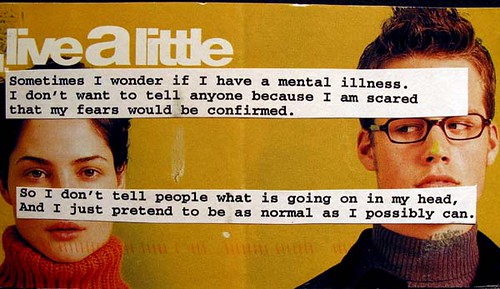
(Image from PostSecret)
After Peter Kramer wrote the groundbreaking and highly readable Listening to Prozac, millions of depressives who'd been suffering to various degrees for years were convinced that SSRIs could not only relieve their melancholy, it could alter their personalities. Hell, it might even make them richer and more sexually attractive in the bargain. (Look what just talking about them did for Peter Kramer!) In many ways, the drugs proved to be the miracle that Kramer touted. But not a panacea. Not a cure. Sometimes they stopped working. Thus, the phrase "Prozac poop out" was born. And sometimes the side effects were worse than the disease.
There were even side effects to writing about them. One that afflicted Kramer was a question that was thrown at him wherever he went" What if Van Gogh had taken anti-depressants?" In fact, he heard the question or a variant of it so often, and was so annoyed by it, that he wrote an entire book in response. About Depression is a fairly interesting read, but it's basically an article expanded to book length. After reading it, I would summarize his answer to the question this way:
Depression is an illness, dammit--not a romantic state of mind. And like diabetes or epilepsy or any other disease, it should be treated.
As someone who is familiar with both depression and creativity, I agree. And yet, no one can deny the connection between the melancholic temperament and the urge to create art. The way I see it, it's as simple and logical as a mathematical equation. It goes something like this:
Look too deeply into the human condition and you're gonna get a little bummed.
Spend too much time in the depths of melancholy, you start looking for a way to claw your way out. That's when you pick up pen, paint brush, saxophone, and start to howl.
And then, there's what I call the "artist's lifestyle equation:"
Spend most of your days alone with your "work," a product that the world does not know it needs, and doesn't hestitate telling you so and you're gonna get pretty damn depressed--even if you weren't before.
That's the life of the artist. It's the proverbial vicious cycle--and somewhere in the middle of the cycle lies the gift, large or small, which the artist gives to the world, or just to herself.
So what if Van Gogh had taken anti-depressants? He probably would have enjoyed life more--though its obvious from his swirling ecstatic visions that in his highs, he experienced the kind of bliss that few know. But if he'd had access to Prozac, he might have been more fun at parties, maybe would have even lived longer. But would he have been less creative? I don't think so. I don't even think it would have prevented him from cutting off his ear. (There are always bad days.) For one thing, as I said before, Prozac has its limitations. It mitigates but doesn't cure. And besides, once you've known the depths, the insight stays with you. The insight and the urge to show and tell what you've seen.
Speaking of depression, apparently Nick Hornby, (one of my personal favorites) has recently penned a novel about the subject. I haven't read A Long Way Down yet so I can't comment on it. All I can say is that if Hornby hadn't previously experienced the affliction he was writing about, yesterday's review by Michiko Kakutani in the NYT
would definitely give him an opportunity to do so. Apparently, the novel is about a group of depressed people who've gathered on a rooftop to commit suicide. The reviewer calls it "a maudlin bit of tripe," and repeats the phrase "sappy and predictable" a couple of times just to make sure we get it. Ouch. Pass the Prozac, or at least a double shot of Jack Daniels.
Like I say, I haven't read the book so I'm in no position to disagree with her criticism. What I can disagree with is the blithe way with which she dismisses suicidal depression. Why don't these people just go get counselling or take anti-depressants? Kakutani wants to know. Well, for one thing, Michiko, people who are that depressed frequently feel so hopeless that they don't have the will to pick up the phone. And secondly, that shit doesn't always work. Just goes to prove that sometimes even highfalutin literary critics can ramble on like Dr. Phil. Err, what was that she said about sappy and predictable?
3 comments:
You go girl! Right on!
We learn much about Van Gogh in his aloneness, in his anomie. His life was an absurdity, in that he was unable to hear the voices that could steer him to safety, and at the end mangled the means to hear at all.
There is a value to sorrow, a value to the saturnine shadows of the human heart. Discovering what that value is in each us may be the creative journey.
And, yes! Pax is better!
Hear, hear!
Post a Comment